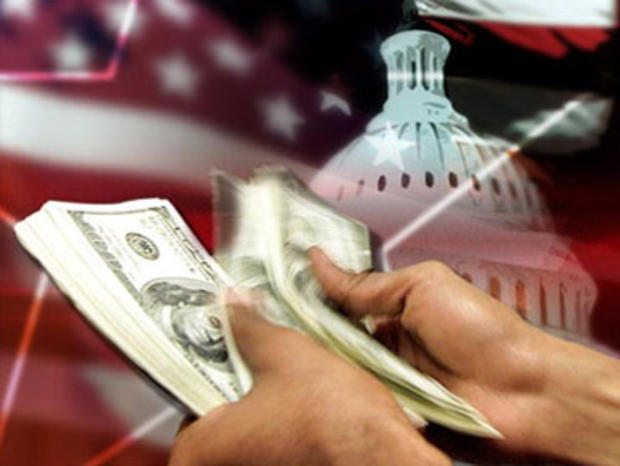Will Midterm Elections be Won - or Bought?
Despite the memorable players (Delaware's Christine O'Donnell), the shocking primary upsets (Alaska's Joe Miller) and the over-the-top rhetoric (the omnipresent Newt Gingrich), the 2010 campaign cycle has in many ways been familiar: The airwaves are awash in nasty and misleading attack ads, races are getting bogged down in distractions involving everything from housekeepersto Nazis, and voters are left trying to make sense of it all - and wondering if they should even bother.
Yet Democrats will tell you that there is one potentially revolutionary difference between the 2010 cycle and past years - and it's not the presence of the Tea Party movement. Rather, they say, it's the influence of the outside groups, many of which do not disclose their donors, on races around the country.
As the New York Times reported Monday, GOP-affiliated groups have begun a "carefully coordinated" final push to help Republicans take over the House and even potentially the Senate, which is more of a long-shot. While both parties benefit from outside groups, such interests have worked disproportionately on behalf of Republicans: According to Bloomberg, between Sept. 1 and Oct. 20, GOP leaning groups spent $118 million to $45 million for their Democratic counterparts.
President Obama, Vice President Biden and House Speaker Nancy Pelosi have all complained about hundreds of million dollars in outside spending to help the GOP. They have focused particularly on the fact that, as Pelosi put it, the influx is essentially "secret money from God knows where" because many donors aren't disclosed.
In the Washington Post, liberal columnist E.J. Dionne complained that if in a Third World country "a small number of millionaires and billionaires spent massive sums to push the outcome in their preferred direction," many Americans would "condescendingly tut-tut." Yet, he writes, that's exactly what is happening here.
"This is a huge, historic deal, yet many in the media have treated the spending avalanche as a normal political story and arguments about its dangers as partisan Democratic whining," writes Dionne. "Some have even maintained that money doesn't really matter in elections, which makes you wonder why people who know quite a lot about politics (one thinks of Karl Rove) have spent so much energy organizing these fundraising and advertising efforts."
CBSNews.com Special Report: Campaign 2010
Yet Republicans and some media outlets say Democrats' dire warnings about the influence of outside money are overstated. Politico, the influential purveyor of the sort of conventional Beltway wisdom that Dionne seems to be deploying, deemed outside money an "excuse" for Democrats trying to shift blame for expected midterm losses.
According to Politico, experts say that contributions from outside groups will only ultimately make up about 10 percent of the total money spent - a significant chunk but seemingly not enough to sway an entire electorate. And as the Wall Street Journal first noted, public sector union AFSCME looks like the biggest outside campaign spender in the 2010 election cycle, and it's working on behalf of Democrats.
Much of the outside money is going to close the fundraising gap between Democratic incumbents and their Republican challengers. When GOP candidates can't afford to match their incumbent Democratic opponents in campaign spending, outside groups run ads attacking the Democrats on their behalf. Their goal is to push enough marginal seats into their party's column to ensure control of the House.
In previous cycles it was largely the party committees - think Michael Steele's embattled RNC, along with Senate and House campaign committees - that stepped in to help underfunded candidates. Now those groups are augmented by those technically outside the process, which can't legally coordinate with party committees but certainly keep an eye on where they are spending their money.
Republicans have played down the importance of these outside groups: It is the unpopularity of Democratic proposals like the stimulus package and health care bill, not spending by groups like American Crossroads GPS, that they say will ultimately decide who controls the next Congress.
The truth, as so often in politics, seems to lie somewhere in between. There is genuine anger among the American electorate, but it is impossible to say to what degree that anger is organic - a Tea Party uprising, if you will - and to what degree it has been drummed up by on-message candidates and associated advertising.
The repercussions, however, are less mysterious: Democrats are almost assured of at least some losses in both houses of Congress. The question at this point boils down to how bad those losses will be. There are conflicting signs: A poll showing independents breaking in large numbers for the GOP would seem to set the stage for a Republican wave, while early voting suggests Democrats may be better off than many people believe them to be.
President Obama will spend much of the next week traveling the country in an effort to limit the damage - though as he surely knows, similar efforts on the part of Bill Clinton back in 1994 were essentially futile. Behind closed doors, some Democrats are acknowledging they wouldn't mind if things went the same way this year, since a GOP House (and potentially Senate) would give Mr. Obama the foil he has sorely lacked in his first two years.
At this point, most political observers expect Republicans to emerge from November 2nd with a narrow majority in the House while Democrats maintain a slim majority in the Senate. With both chambers in play, the two sides are working feverishly to make sure their supporters cast ballots - even if it's just to vote against the other guy. And while we'll soon know just who will control the next Congress, the debate over the degree to which the outside groups influence politics - and to what degree they should - appears to be just getting started.
Brian Montopoli is a political reporter for CBSNews.com. You can read more of his posts here. Follow Hotsheet on Facebook and Twitter.



